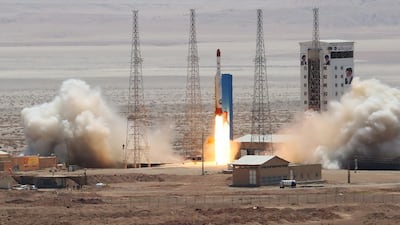The United States, France, Germany and Britain have condemned Iran’s test of a satellite-launching rocket this week, saying it was “inconsistent” with the UN Security Council resolution that enshrined into law the nuclear accord with Tehran.
The countries, in a joint statement issued on Saturday, stopped short of calling the launch a violation of the deal.
“With its latest launch of a Simorgh space launch vehicle on 27 July, Iran has again demonstrated activity inconsistent with UN Security Council Resolution 2231,” the three permanent Security Council members and Germany said. “We condemn this action.”
“This resolution calls upon Iran to not undertake any activity related to ballistic missiles designed to be capable of delivering nuclear weapons, including launches using such technology like this launch,” the nations said. “Space launch vehicles use technologies that are closely related to those of ballistic missiles development, in particular to those of Intercontinental Ballistic Missiles.”
The statement also noted Iran's firing of cruise missiles into western Syria last month and the testing of a medium-range ballistic missile on July 4. The European countries said they were discussing their concerns with Iran bilaterally. The continuing development of Iran’s ballistic missile programme has a “destabilising” regional impact, according to the statement.
Since resolution 2231 was passed in 2015, the three European countries and the US have on several occasions said Iran's missile tests were inconsistent with the spirit, if not the letter, of the agreement they negotiated with Iran alongside Russia and China.
The resolution does not place any restrictions on Iran’s ballistic missile programme, and only “calls upon” Iran to not develop missiles expressly designed to deliver a nuclear warhead. This loophole essentially allows Iran to test technology that it says is for conventional weapons, but that could also be used for a nuclear weapon.
The Iranian foreign minister, Javad Zarif, defended the space rocket launch on Twitter, saying that Iran “is not and will not be developing nuclear weapons; so by definition cannot develop anything designed to be capable of delivering them”.
The European countries, along with Russia and China, however, have not backed US president Donald Trump’s stance on the deal or Iran, as they pursue deeper economic ties with Tehran. They have consistently expressed anger over Iran’s missile tests but have never called them violations of the deal.
The joint statement shows increased rhetorical support for Mr Trump — whose state department issued additional sanctions on Iran’s missile programme on Friday — but does not appear to mark a substantive shift in their position on the tests.
On Thursday, the US state department said that the Simorgh launch was a violation of other Security Council resolutions, as well as the spirit of the Joint Comprehensive Plan of Action — the name of the Iran nuclear accord — and added six Iranian entities to US sanctions over their ties to Tehran’s ballistic missile programme. All of the businesses are subsidiaries of the Shahid Hemmat Industrial Group, which the US treasury says is “central” to the programme.
The Simorgh launch came a day after Mr Trump warned Tehran that there would be “big, big problems” if it violated the nuclear agreement.
The US president vowed to “tear up” the deal during his election campaign, but has been convinced by his national security advisers to keep certifying it every 90 days, as required by US law. The world powers that negotiated the multilateral deal would not agree to reinstate international sanctions on Iran if the US was seen as scuttling the deal.
But Mr Trump is reported to be looking for ways to increase pressure on the deal by finding stricter ways of enforcing it, including by pushing for inspections of Iran’s military sites where nuclear work might be taking place.
But for that to happen the US administration would need the International Atomic Energy Agency, which is monitoring Iranian compliance, as well as a majority of the signatories to the JCPOA to back a move for additional measures such as military site inspections.
So far the European countries and IAEA have resisted, citing a lack of any evidence of serious infractions, according to an AP report on Washington’s attempts to push for the inspections.
The six designations by the state department came after the US treasury designated 18 separate entities over their role in Iran’s ballistic missile programme, which the state department said was in “direct defiance” of the nuclear deal, although not a violation of it.
Iran has increased the pace of its ballistic missile tests as the Trump administration continues its review of policy toward its chief Middle East adversary.
Mr Trump is also set to sign a new law that places more sanctions on Russia, North Korea and Iran. Iran’s foreign ministry on Saturday condemned the new sanctions, saying “we will continue with full power our missile programme”. Spokesman Bahram Ghasemi said it was “ultimately an effort to weaken the nuclear deal”.
The spiking tensions between Washington and Tehran have also been in increasing naval confrontations in the Arabian Gulf in recent months. On Saturday Iran’s Revolutionary Guard Corps said that the US navy had approached a patrol boat and fired flares in what it called a “provocative” incident.
It comes days after another US vessel fired warning shots at an IRGC boat that approached the ship.

